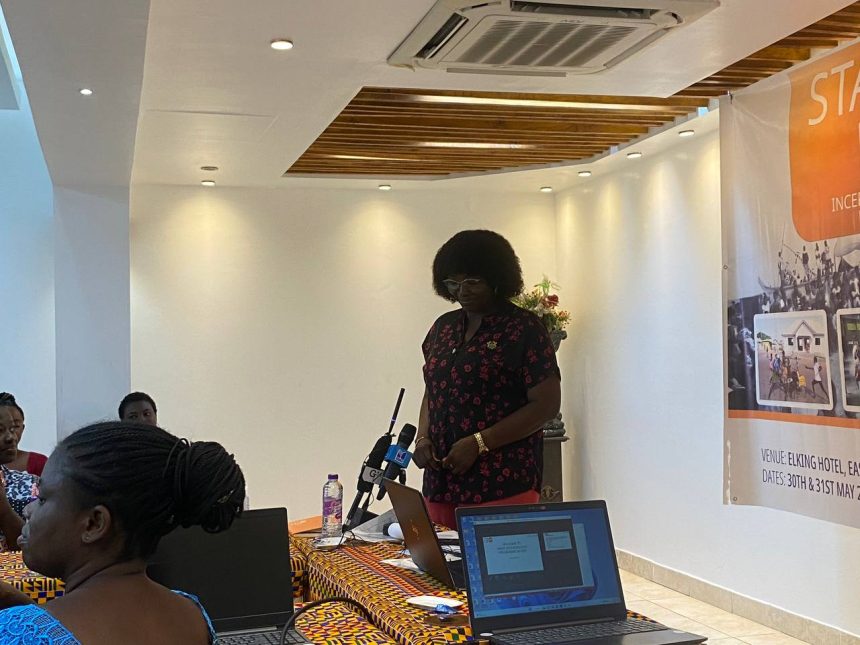The United Nations Population Fund Ghana (UNFPA Ghana) has called on government to address the disparities in the age for sexual consent in the country.
In a plea to policy and lawmakers, the Regional Focal Person for UNFPA Ghana and Bono East Regional Coordinating Council, Julian Harrison Mutaah, highlighted the stark disparities in Ghana’s age of consent and marriage laws.
Julian Harrison Mutaah called for urgent action to address the inconsistencies that are leaving Ghanaian girls vulnerable to teenage pregnancy and a lack of skills.
Speaking at a stakeholder meeting in Accra focused on documenting regional success stories of young girls under the UNFPA and UNICEF Adolescent Girl’s Programme, Mutaah stressed the need to reevaluate the age at which consent to sex is legally granted.
Currently, Ghana’s laws stipulate that engaging in sexual activity with a child under the age of 16 is considered defilement, while the legal age of consent is 16. However, the minimum age for marriage in Ghana is 18, leading to a confusing legal landscape.
Julian Harrison Mutaah highlighted the alarming reality that girls as young as nine years old are experiencing menstruation due to environmental changes and dietary habits. This early onset of puberty brings with it the possibility of pregnancy, emphasizing the urgency of the situation.
According to her, if a 16-year-old girl consents to sex and subsequently becomes pregnant, she finds herself trapped in a legal paradox. Unable to marry until the age of 18, she embarks on motherhood without the necessary skills or support.
“One of our challenges is the age gap or the age to consent to sex. We’ve realised that when it comes to our laws in Ghana, there’s a big disparity in the age of consent to sex and the age of consenting to marriage. From 0 to 15, when a child even consents to sex, we call it defilement. We say that our consenting age is from 16 to 17 and then 18 years you can give a child up for marriage. But we are realising that a child at age 16 and 17 cannot get married. But what leads to sex? Normally we say it is unless we enter into marriage before we can have sex, but at age 16 if a girl consents to sex and gets pregnant, the girl get cannot go into marriage, because it’s against our laws. So we are pleading with our law makers, our policymakers, that they should look into such laws for us, because it’s just contradicting each other. So for us to curtail teenage pregnancy, or to reduce it, I think that we need to do something about the consenting age,” she said.
To address these challenges, Mutaah proposed amending the law to extend the non-consenting age from zero to 17, ensuring that any sexual activity with minors below the age of 18 is considered a crime.
According to her, closing this legal loophole, Ghana can provide a more comprehensive framework for protecting its girls and combating teenage pregnancy effectively.
“Now, if they can add this to the the non-consenting age, that is the zero to 15. So that we know that from zero to 17, If a girl consents to sex, it’s a crime. Because now as we stand now, if a girl consent to sex at age 16, to 17, it’s not a crime. If you get the person in the act, or if the person reports that person to the laws, it’s not a crime. But if we are able to add it up to age 17, from 0 to 17, they will know that it’s a straightforward law. Because a person at 16, when she goes into sex can get pregnant,” she added.
Additionally, Mutaah called for a review of the marriage laws, emphasizing the importance of ensuring that young girls are equipped with skills and education before entering into marriage.
She added that granting an 18-year-old girl to a man without any skills or training would limit her potential and perpetuate cycles of dependency.
The stakeholders present at the meeting echoed Mutaah’s sentiments, recognizing the urgent need for legislative reform to safeguard the well-being and future prospects of Ghanaian girls. They pledged to work together, engaging policymakers and lawmakers to address the inconsistencies within the current legal framework and enact changes that align with the best interests of Ghanaian youth.
The stories shared during the inception and impact session in Accra served as powerful reminders of the challenges faced by young girls in Ghana. It is hoped that these narratives will resonate with decision-makers, prompting them to prioritize legislative amendments that protect the rights and dignity of Ghanaian girls, provide equal opportunities for growth and education, and help curtail the alarming rates of teenage pregnancy.
As the stakeholders continue their advocacy, there is renewed optimism that Ghana’s lawmakers will heed the call for change, leading the nation towards a future where girls are protected, empowered, and equipped to reach their full potential.
What do the laws of Ghana currently say about sexual consent?
In Ghana, the laws regarding sexual consent are governed by the Criminal Offenses Act, 1960 (Act 29). The act sets the age of consent for sexual activity at 16 years. This means that individuals who are 16 years or older can legally consent to engage in sexual activity.
However, it’s important to note that the act also criminalizes certain types of sexual activity involving individuals under the age of 18. For instance, the act defines “defilement” as engaging in sexual intercourse or any unnatural carnal knowledge with a child under the age of 16, with or without their consent.
Defilement is considered a criminal offense, and those found guilty of defilement can face severe penalties, including imprisonment.
The laws regarding marriage in Ghana also impact the age of consent to some extent. The Marriage Act, 1884 (Act 127) states that the minimum age for marriage in Ghana is 18 years for both males and females. However, there are provisions that allow for marriage at the age of 16 or 17 with the consent of parents or guardians and the authorization of a court.
It’s important to note that the marriage age of 18 is the legally recognized age for marriage in Ghana, and individuals below this age cannot be married without the appropriate legal approvals.
It’s worth mentioning that efforts have been made to review and amend the laws surrounding sexual consent and child marriage in Ghana to better protect the rights and well-being of children and adolescents. These efforts aim to address the inconsistencies and gaps that exist in the current legal framework.
–
Story by: Kelly Adjetey Boye | univers.ug.edu.gh




